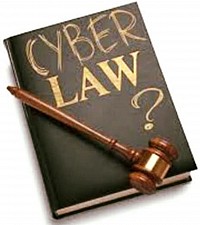Law For Cyber Crime In India
Law For Cyber Crime In India
Law For Cyber Crime In India
Cyber Crime Laws in India or Cyber Crime Law in India is important because of the main reason why the Cyber Crime Law in India understands and covers every aspect that takes place on or with the internet: transactions and activities related to the internet and cyberspace. Cybercrime can include traditional criminal acts such as theft, fraud, malice, counterfeiting or slander which fall under the Indian Penal Code 1860; and new age crimes fall under the Information Technology Act of 2000. Although the supreme courts that ruled in the Sharat Babu Digumarty case ensured that no person can be charged under the Indian Penal Code with a crime related to certain acts or omissions, if the information of the Technology Act can also apply to one and the same actions or omissions, it is a fact that crimes such as theft and obscenity will be punished differently if they are related to the cyber element.
While sections 43, 66 and 67 of the Information Technology Act provide for broad sanctions for cybercrime, it was not until 2008 that the Information Technology Act was amended12 to introduce provisions for specific cybercrime, such as through communications The server sends abusive messages, dishonestly receives stolen computer resources. or communication devices, identity theft, invasion of privacy, cyber terrorism, etc. The Information Technology Act came into force in India. India soon became the 12th country to legalize IT regulations. The initial project was then created under the Electronic Commerce Law passed by the Ministry of Commerce in 1998; amendments to the Information Technology Law were passed in May 2000.
With the advent of increasingly sophisticated cyberattacks, overcome by the human propensity to misuse technology, a number of amendments have followed. The amendments[2] were made in light of the Cybercrime-IT Act of 2000 through the IT Act of 2008. One of the main positive aspects of the IT Amendment Act compared to the original IT Act of 2000 is the rank of "inspector" or higher was authorized to investigate cybercrimes, as opposed to the rank of "Deputy Superintendent of Police" or higher required by the original Information Technology Act.
The IT Law was last amended in 2008, after which technology has made great strides. “Cybercrimes” are crimes related to computers, information technology, the Internet and virtual reality. Information Technology Act 2000 (“IT Act”) The “IT Act” and the Indian Penal Code 1860 (“IPC”) provide guidelines and legislation regarding cybercrime. It is argued that the legislator should repeal all cyber crimes in the Information Technology Act as soon as possible and amend the Indian Penal Code accordingly (to cover all cyber crimes, including those currently covered by the Information Technology Act).
Sections 43 and 66 of the Information Technology Law punish anyone who commits data theft, transmits viruses to the system, hacks, destroys data or denies network access to an authorized person with up to 3 years of imprisonment or a fine of Rs 5 or both. , and others. The Misuse of Computers Act criminalizes any act that provides unauthorized access to a computer or corrupts the data it contains. Simply put, we can say that cybercrime is an illegal act in which the computer is the tool, or the target, or both. Cybercrime, also called cybercrime, is the use of a computer as a tool for additional illegal purposes such as committing fraud, trafficking in child pornography and intellectual property, identity theft or invasion of privacy.
Cyber crimes against government include hacking, access to confidential information, cyber warfare, cyber terrorism, and software piracy. The predominant forms of cyber theft include data breaches, identity theft, financial theft, and online time theft, among others. Crimes against people such as computer pornography, computer harassment, computer slander.
Extreme online harassment may be subject to federal penalties, such as 18 U.S.C. 2261A, which states that threats or harassment using a computer can result in up to 20 years in prison, depending on the action taken. The United States, Missouri, and more than 40 other states have enacted laws and regulations that criminalize extreme online harassment. In addition, various national laws, such as the USA Patriot Act of 2001, have expanded the powers of law enforcement to monitor and protect computer networks.
The Internet requires not only methods to enforce old laws, but also new laws that cover new types of crimes such as viruses and hacking. As human dependence on technology intensifies, computer laws in India and around the world need to be constantly updated and refined.
It is also hoped that more appropriate changes can be made to India's cybersecurity legislation in 2021 to include legal provisions to deal with the challenges posed by new emerging technologies. Another major cyber law trend in India for 2021 will be the approval and implementation of the Personal Data Protection Act 2019.
In addition, to mitigate cybercrime and thwart the efforts of fraudsters, lawmakers need to be on the lookout for potential cybersecurity loopholes and fix them in real time. Cyberterrorism is a global problem and the damage that can be done by one global incident will be irreparable. Given the ramifications of a weak system, it is necessary to constantly change the IT Law and introduce new laws in order to keep up with crime in today's world. Now the scope of the revision of the Information Technology Law has been expanded to include all the latest communication devices. Identity theft and related cyber fraud are included in the Indian Penal Code (IPC) 1860, which is enforced in conjunction with the Information Technology Act 2000. Corporate stakeholders cite the Companies Act 2013 as a necessary legal requirement to carry out day-to-day operations.


